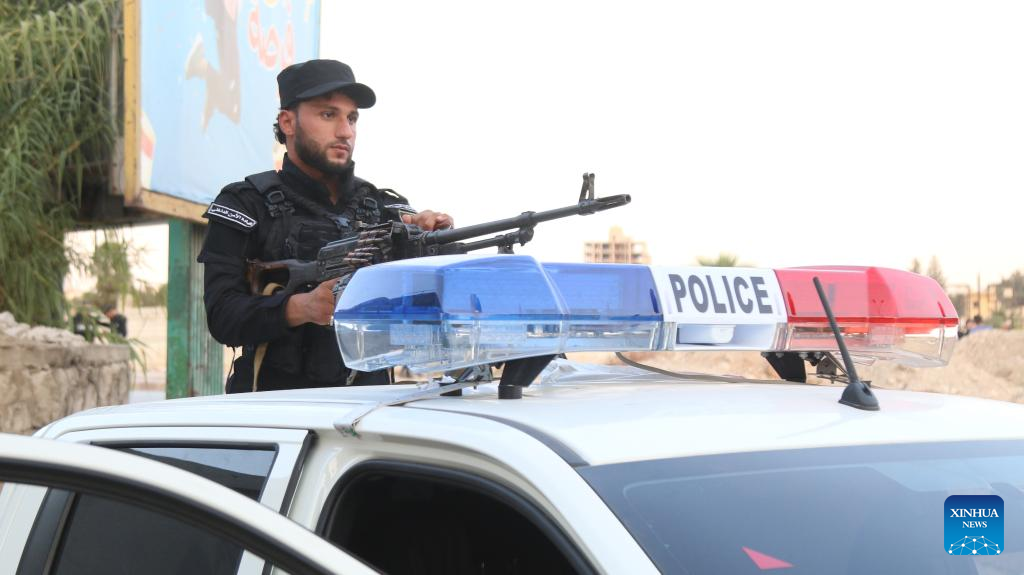
DAMASCUS - Syria's chief of defense authorities said Tuesday he met with Kurdish-led forces' commander Mazloum Abdi in Damascus and agreed to an immediate ceasefire across all fronts in northern and northeastern Syria, following a day of fierce clashes between government-aligned forces and the Kurdish-led Syrian Democratic Forces (SDF).
In a brief statement, Marhaf Abu Qasra, chief of defense authorities, said that the meeting resulted in "a comprehensive ceasefire covering all axes and deployment points in northern and northeastern Syria, to be implemented immediately."
The ceasefire announcement came hours after heavy fighting shook the Kurdish-held neighborhoods of Sheikh Maqsoud and Ashrafiyah in Aleppo, killing one security officer and wounding several others, according to defense authorities.
The war monitor Syrian Observatory for Human Rights said pro-government forces had earlier surrounded the two districts, using heavy and medium weapons in what it described as the most serious escalation since March.
Defense authorities said the recent troop movements were part of a planned redeployment aimed at "securing strategic points" following repeated SDF attacks on civilians, the army, and security forces. They stressed Damascus remains committed to the March 10 agreement with the SDF and had no intention of a broader offensive.
The Britain-based Syrian Observatory for Human Rights said heavy and medium weapons were used as pro-government forces targeted the Sheikh Maqsoud district in northern Aleppo amid reports of an attempted incursion.
Pro-government forces had closed off all entrances to the Sheikh Maqsoud and Ashrafiyah neighborhoods, effectively placing them under siege, it said.
The Syrian defense authorities' media office said in a statement that the army movements in northern and northeastern Syria were part of a planned redeployment following repeated SDF attacks on civilians, the army and security forces.
It said the redeployment aimed to "secure strategic points" and insisted the government remains committed to the March 10 agreement with the SDF, denying any intent to launch a wider offensive.
The army "stands by its responsibility to protect civilians' lives and property, as well as the safety of its personnel," it said, adding that one internal security member was killed and three others were wounded by SDF shelling.
ALSO READ: Syria's transitional authorities launch vote for new legislature
Aleppo Governor Azzam al-Gharib urged residents to stay indoors overnight and avoid conflict zones as clashes intensified. In a Facebook post, he said the internal security and defense forces "have always sought to preserve the safety of citizens and have no intention of any military escalation."
The army's redeployment to the city's outskirts followed "numerous violations committed by the SDF in recent weeks, aided by remnants of outlawed groups," he said, expressing hope that "this will be the last night Aleppo hears the sounds of fighting."
He stressed that the authorities had shown patience and continued to honor the March 10 accord with the SDF while keeping the door open for dialogue.
State media reported that SDF snipers were positioned on rooftops in the two neighborhoods and that several civilians were wounded by SDF shelling and transferred to a local hospital. As a result, dozens of families fled the area amid continued exchanges of fire, while others were reportedly trapped by sniper activity.
In a statement late Monday, the SDF denied that they had attacked government checkpoints, calling such allegations "entirely false." The group said its units had no presence in the area since withdrawing under the April 1 agreement, and accused Damascus of provoking the latest violence.
"What is happening in Sheikh Maqsoud and Ashrafiyah is a direct result of repeated attacks by Damascus-aligned factions against civilians," the statement said, accusing those forces of imposing "a suffocating security and humanitarian blockade," cutting off aid and medical supplies, and abducting residents.
The SDF said authorities-aligned forces "attempted to advance with tanks and armored vehicles, targeting residential areas with mortars and drones," which caused civilian casualties and property damage. It said residents, together with local internal security units, had defended themselves against "escalating aggression."
Holding the Damascus authorities "fully responsible for the deteriorating humanitarian situation," the SDF urged international and humanitarian organizations to intervene to end what it described as "an unjust siege and systematic assaults on civilians."
Tensions between the SDF, a US-backed Kurdish-led coalition, and Syria's new transitional authorities have simmered for months, threatening the fragile stability that followed the fall of Bashar al-Assad in December 2024.
The SDF, which controls the oil-rich northeast, seeks broader autonomy and recognition of Kurdish rights -- goals that clash with the new government's drive for a unified central state. Disputes over control of oil fields and the integration of SDF forces into the national army have fueled repeated confrontations.
Despite an agreement signed on March 10 between SDF commander Mazloum Abdi and Syrian interim leader Ahmed al-Sharaa pledging cooperation and cultural protections, vague terms and mutual distrust have slowed progress. The parliamentary elections held on Sunday excluded SDF-held regions, deepening alienation.


